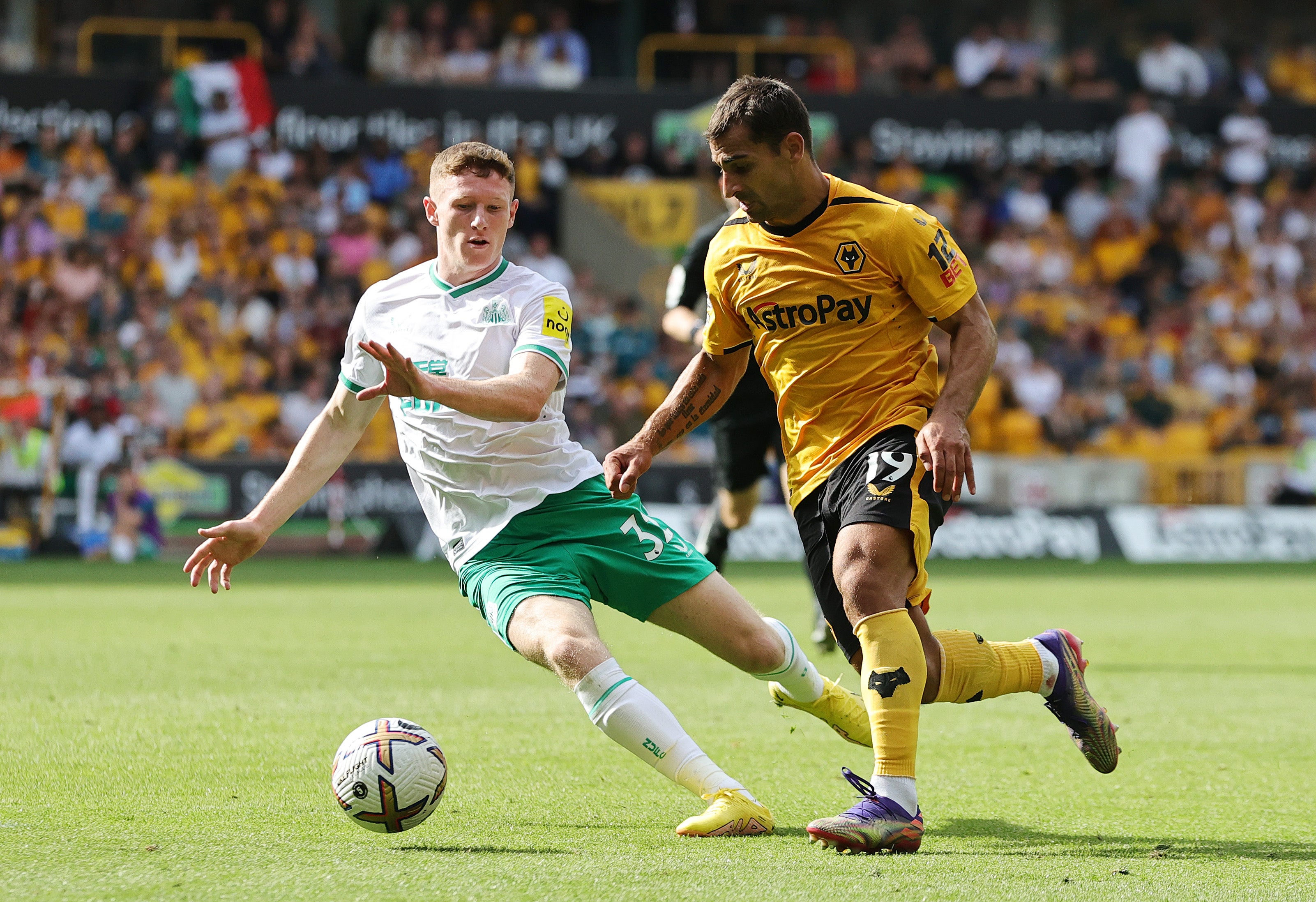Newcastle trapped between past and future as Eddie Howe seeks balance
Eddie Howe has the luxury to soon call on £60m signing Alexander Isak, but the remnants of a less-loved era remain after another impressive result
One by one, Eddie Howe ran through the list of substitutes who played their parts in a comeback. Matt Ritchie, Matt Targett, Ryan Fraser, Jacob Murphy and Elliot Anderson. Four have been stalwarts of Championship teams. The youngster Anderson, meanwhile, brimmed with promise on just his second Premier League outing but most of his first-team football has come in League Two.
A couple of minutes earlier, Howe had been discussing Alexander Isak, the £60 million signing who has attracted comparisons with Zlatan Ibrahimovic. The Swede was the most expensive spectator at Molineux as Newcastle drew with a cast list shorn of some of the glamour belatedly brought to St James’ Park. Arguably, Howe has made three statement signings and two – Isak and Bruno Guimaraes – did not feature against Wolves.
If Howe had a team of two halves at Molineux, with four of his recruits in the back five and just one in the front six – Chris Wood, soon to be demoted to third-choice striker – there are also two Newcastles for now. The old and the new, the downmarket and the deluxe, Steve Bruce’s compromise choices and Howe’s higher-grade acquisitions form a transitional side, trapped between past and future.
There are two realities, with remnants of the age of austerity, some bought to secure promotion and retained as Mike Ashley settled for stasis. In their own way, Ritchie, Fraser and Murphy are symbols of an unloved era, even if the auxiliary left-back, in particular, has proved a fine servant.
There is a chance each will be eased out over the next year or two, replaced by luxurious upgrades, while Targett was a pragmatic buy in January, yet the formula of bolting together different worlds has been strangely successful.

Rewind 13 years and Manchester City’s uneasy blend of old and new dipped into the relegation zone. Howe inherited a Newcastle team who were 19th; now they have made one of only five unbeaten starts, despite facing two of the others who are undefeated.
Allan Saint-Maximin’s late equaliser did not merely keep an August run going. Howe’s Newcastle have been all but unbeatable against the rest: since Christmas, they have lost five of 24 Premier League matches, but four were to Chelsea, Tottenham, Liverpool and Manchester City. It leaves March’s loss at Everton looking the lone aberration.
It gives them a level of consistency many another can only envy, despite the shift in personnel. Rewind to December and some of the starting 11 may have looked Championship calibre; now much of the bench does, even if a sprinkling of newer additions may be more accustomed and suited to the Champions League.
The run began before Howe had been able to make a signing. If Isak now looks the most exotic acquisition, the eighth arrival also looks the exception. If he has bought half a high-class team, three of them – Nick Pope, Kieran Trippier and Sven Botman – are found in the defence and Guimaraes normally shields it. That new-look rearguard has only been breached by Manchester City and a Ruben Neves thunderbolt this season. Yet if Newcastle have built from the back, it is allied with some attacking intent, which Isak may appreciate. “If I’m looking at it through his eyes I would be excited looking at the team and how many chances we could create for him,” Howe said.

In the 22-year-old Swede, like Botman, like Guimaraes, there is the potential for improvement. If there was short-termism in the other three arrivals, of Dan Burn, Targett and Wood, only the centre-forward feels a disappointment: he provided a foil in an improved run of form last season, but has two goals in 20 league matches, the leveller at Molineux came after he was removed so Saint-Maximin could operate as the striker and his £25 million fee always looked excessive.
He should become a still more marginal figure. The same fate beckons for several Howe was bequeathed, whereas Anderson’s bright cameo hinted he may have a greater part to play in forthcoming years. If any team contains careers on the up and the down, the divide seems starker at Newcastle, which perhaps underlines the achievement in forging the sort of spirit required to make comebacks.
Those differences may be personified by Wood and Isak, by the first two striking signings of the new regime. The £25 million man owed his place to a Callum Wilson injury and bureaucracy as the £60 million newcomer sat in the stands. On the day Newcastle first wore their controversial new green-and-white, Saudi-influenced away kit, perhaps there was an irony in that. Isak is waiting for a work permit. “We are in the government’s hands,” said Howe. There is a theory the British government gave the green light to Newcastle takeover. But if geopolitics are playing their part, governmental inactivity and incompetence is affecting millions in the UK. Now it delayed the debut of Newcastle’s new record buy.
Join our commenting forum
Join thought-provoking conversations, follow other Independent readers and see their replies
Comments
Bookmark popover
Removed from bookmarks